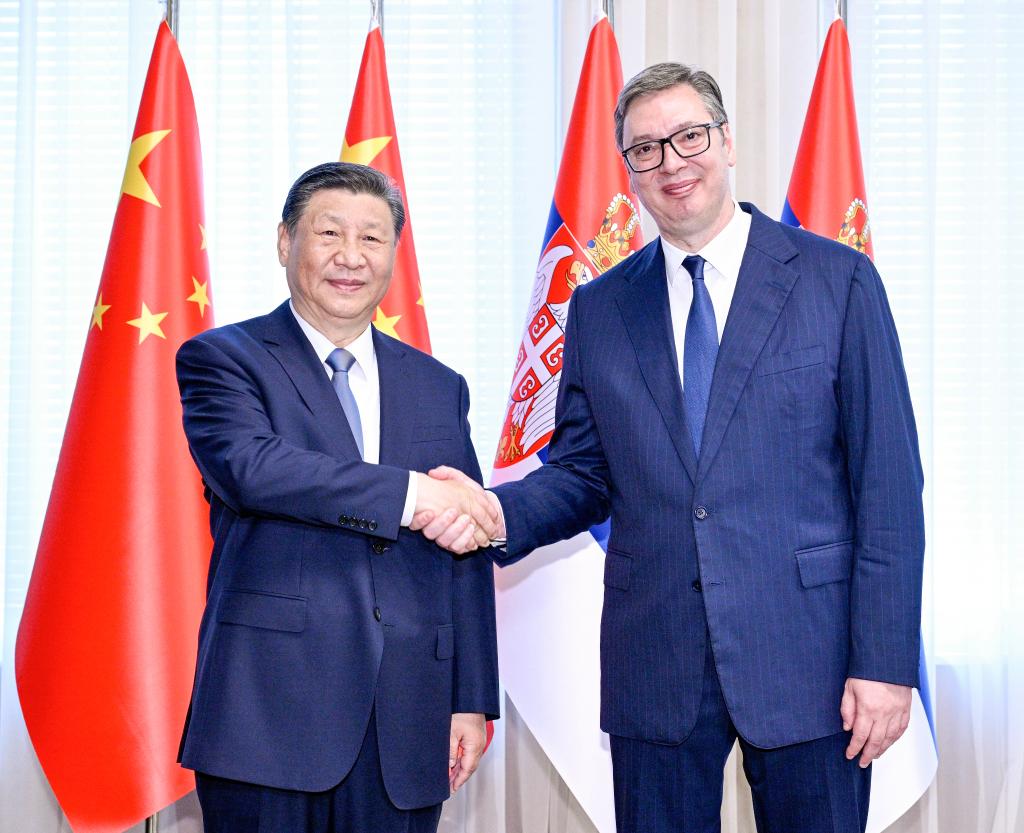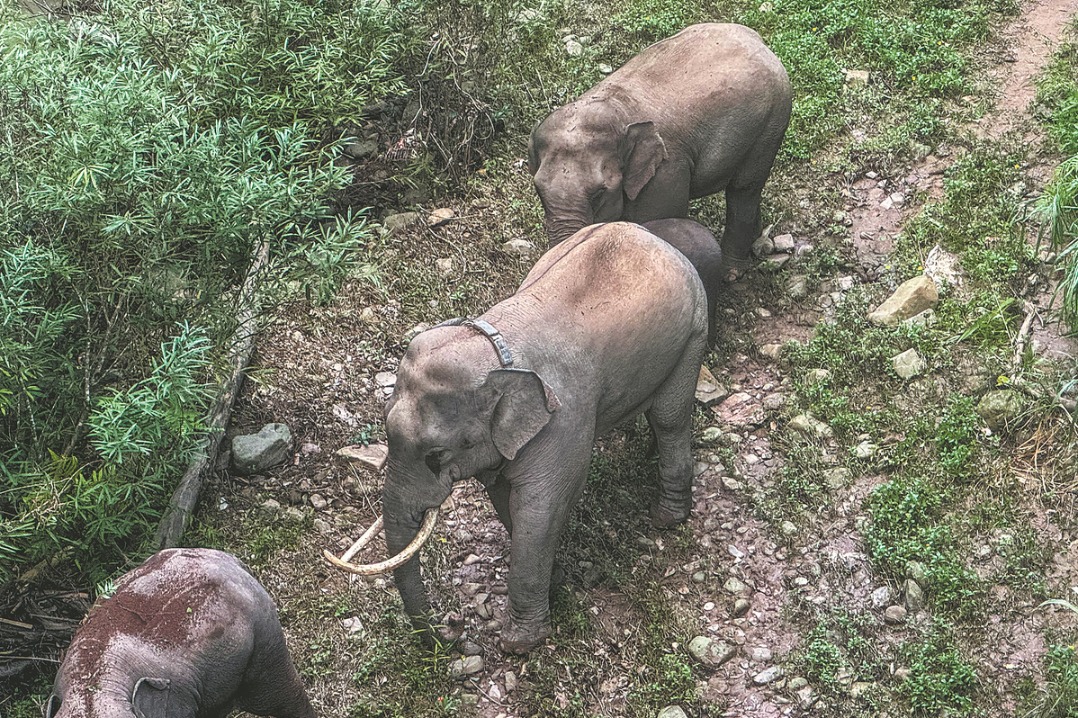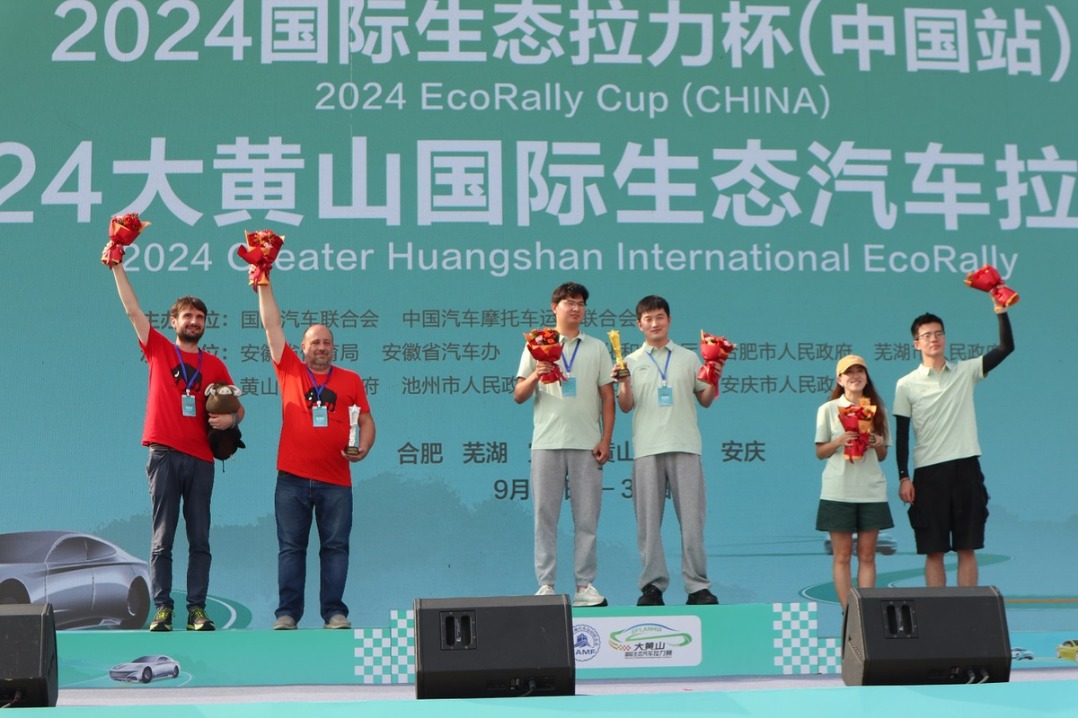Xi concludes Serbia visit with elevated ties, deepened friendship and promising cooperation


BELGRADE -- Chinese President Xi Jinping wrapped up his state visit to Serbia on Wednesday, bundling up a multitude of deals and a strengthened bond of friendship with the country.
At the end of a fully-packed day, Serbian President Aleksandar Vucic bid farewell to Xi at the Belgrade Nikola Tesla Airport, where he had welcomed the Chinese president the day before.
UPGRADED TIES
Earlier in the day, Xi and Vucic signed a joint statement on the building of a China-Serbia community with a shared future in the new era, an upgrade of relations from the comprehensive strategic partnership established in 2016.
The deal, which was declared by Xi and Vucic during their meeting in the Serbian capital, makes Serbia the first European country to build such a community with China.
Over the past few years, Xi said, the bilateral relationship has leapfrogged with historic progress, and since the establishment of a comprehensive strategic partnership in 2016, in particular, the bilateral relationship has been enriched in substance and expanded in scope, which has become an example for China's friendly relations with other European countries.
Serbia is China's first comprehensive strategic partner in Central and Eastern Europe, Xi said, adding that under the new circumstances, Serbia has become the first European country to build with China a community with a shared future, which speaks volumes about the strategic, special and high-level China-Serbia relations.
"With this agreement, Serbia is leading the way in its relations with China," said Ivona Ladjevac, deputy director at the Institute for International Politics and Economics in Belgrade.
The announcement on deepening and elevating the comprehensive strategic partnership and building a China-Serbia community with a shared future in the new era marks a new milestone in the history of this bilateral relationship, said Vucic.
The strategic, practical, and innovative nature of promoting bilateral relations will set a benchmark and model for cooperation between the East and the West, Chen Fengying, a researcher at the China Institutes of Contemporary International Relations, told Xinhua in a recent interview.
STRONGER IRONCLAD FRIENDSHIP
The ironclad friendship between China and Serbia has stood the test of the changing international landscape, Xi said, noting that such friendship is characterized by profound historical roots, solid political foundation, extensive common interests and strong popular support.
In a signed article published Tuesday in Politika, a Belgrade-based Serbian daily, Xi wrote that the ironclad friendship between the two countries is ever-growing. "Whatever changes in the international landscape, China and Serbia remain true friends and good partners," he wrote.
The Chinese president's arrival coincides with the 25th anniversary of the NATO bombing of the Chinese embassy in the former Federal Republic of Yugoslavia.
In 1999, the U.S.-led NATO forces carried out savage airstrikes for 78 days against Yugoslavia, leaving more than 8,000 civilians dead or injured and nearly 1 million more displaced. On the night of May 7, exactly 25 years ago, NATO bombed the Chinese embassy, killing three Chinese journalists, including one from Xinhua.
"The Chinese people cherish peace, but we will never allow such tragic history to repeat itself," Xi wrote in the article. "The China-Serbia friendship, forged with the blood of our compatriots, will stay in the shared memory of the Chinese and Serbian peoples, and will inspire us to march forward with big strides."
Gordana, a local resident who didn't reveal her full name, referred to the bombing as a "painful memory" to her. "The cooperation between China and Serbia holds the promise of providing my children with a better life than I experienced," she told Xinhua.
Precious moments of goodwill and friendship are a signature of Xi's short but significant stay in Serbia, which lasts no more than 24 hours.
A telling moment was the grand welcoming ceremony held by Vucic on Wednesday morning with the impressive attendance of more than 10,000 Serbian people.
Crowds were waving the national flags of both countries and chanting "China! Serbia!" with applause and cheers pervading the atmosphere.
"We are here to show our friendship with China, and we want our Chinese friends know that we cherish it very much," said Milos Tosic, a college professor present at the event. Tosic told Xinhua that it is not only his opinion, but one shared "by all the people here today."
At a welcoming banquet around noon, Xi shared his nostalgic memory with Vucic, reminiscing about the Yugoslav film "The Bridge" and the song "Bella Ciao," which have become the fondest memories in his youthful days.
"China will work together with the friendly people of Serbia and make tireless efforts to build a China-Serbia community with a shared future in the new era," Xi pledged in his concluding remarks at the banquet toast.
FUTURE-ORIENTED PARTNERSHIP
During the meeting with Vucic, Xi said the China-Serbia community with a shared future in the new era is an upgrade of the ironclad friendship between China and Serbia, and it also represents their common values and objectives, namely, joint pursuit of development, win-win cooperation and mutual success.
In support of the building of the China-Serbia community with a shared future in the new era, Xi has announced six measures when he met the press together with Vucic. Notable among the measures are a free trade agreement between China and Serbia which will take effect on July 1 and an exchange program under which Serbian youths and young Serbian scientists are invited to visit China in the next three years.
"The sky is the limit," said Vucic, referring to the scope of cooperation with China.
"For Serbia, it obviously brings a great deal," said Aleksandar Pavic, a Serbian political expert. "The opening of the Chinese market with the Free Trade Agreement, academic exchanges ... those are very, very important."
"China offers a hand of cooperation on an equal footing, and offers great opportunities without conditions," Pavic said. "We've grown weary of the zero-sum game for far too long."
The substantial deals added new testimony to the special bond of ironclad friendship enjoyed by China and Serbia.
Past years have seen leapfrog growth of China-Serbia cooperation. Two-way trade in 2023 surged to $4.35 billion, Chinese customs statistics showed. In 2022, China became the largest source of direct investment for Serbia. After the bilateral free trade deal takes effect, more than 60 percent of taxable items will become tariff-free immediately, and the final import volume proportion of both sides with zero-tariff items will reach about 95 percent.
Under the framework of the China-proposed Belt and Road Initiative are flagship projects such as the Smederevo Steelworks and the high-speed railway between Belgrade and Budapest. An integral segment of the Belgrade-Budapest railway is the high-speed train linking Belgrade and Serbia's second-largest city Novi Sad, which has transported some 6.83 million passengers over the past two years.
Serbia has long been known as "the gateway to the Balkans" on the European continent. "Everything that has been done so far and will be done in the future can serve as an example to other countries in the region and throughout Europe to get involved as much as possible," said Aleksandar Mitic, a research fellow also with the institute.
"The principle of mutual benefit can really work," said Mitic.
Serbia, undoubtedly, stands as a reliable partner for China in Europe, said Aleksandar Vojvodic, head engineer of the Clean Serbia Project of China Road and Bridge Corporation.
There will be a promising prospect for further enhancement and expansion of existing cooperation, said Vojvodic.





































